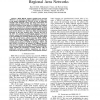Free Online Productivity Tools
i2Speak
i2Symbol
i2OCR
iTex2Img
iWeb2Print
iWeb2Shot
i2Type
iPdf2Split
iPdf2Merge
i2Bopomofo
i2Arabic
i2Style
i2Image
i2PDF
iLatex2Rtf
Sci2ools
107
Voted
GLOBECOM
2009
IEEE
2009
IEEE
Coexistence Problem in IEEE 802.22 Wireless Regional Area Networks
IEEE 802.22 wireless regional area network (WRAN) is an emerging cognitive radio-based system. One of the major challenges for WRANs is how to efficiently schedule both channel sensing and data transmission for multiple adjacent WRAN cells. This challenge is known as coexistence problem. In this paper, we propose four schemes that aim at reducing the coexistence-problem effect. These schemes are based on a well-known operation mode of IEEE 802.22, namely dynamic frequency hopping (DFH). The first and second schemes are based on using omni-directional antennas at the base stations (BSs), whereas the BSs in the other two schemes use directional antennas. The first scheme, coined fixed-scheduling DFH (FDFH), bases upon a fixed scheduling of working channels for adjacent WRAN cells. The second scheme, called cooperative DFH (CDFH), cooperatively selects working channels. The third scheme, namely sectoral DFH (SDFH), is proposed to reduce the coordination overhead of CDFH via dividing a WRA...
Related Content
| Added | 16 Aug 2010 |
| Updated | 16 Aug 2010 |
| Type | Conference |
| Year | 2009 |
| Where | GLOBECOM |
| Authors | Raed T. Al-Zubi, Mohammad Z. Siam, Marwan Krunz |
Comments (0)

